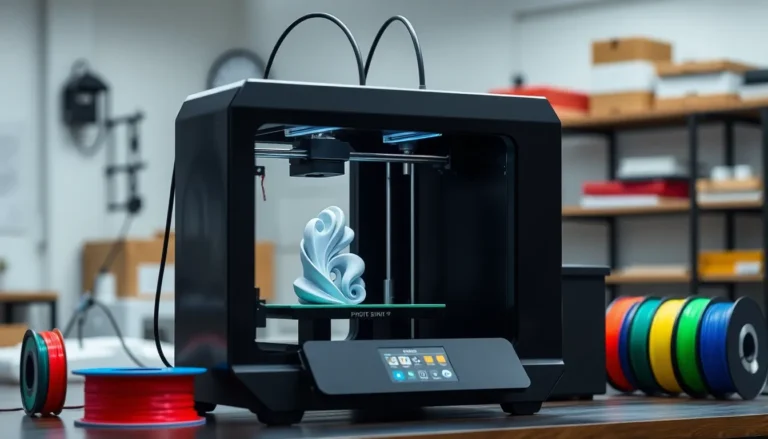Table of Contents
ToggleIn the ever-evolving tech landscape, the terms “coding” and “programming” often spark confusion. While many use them interchangeably, they represent distinct aspects of software development. Understanding the difference can clarify career paths and enhance communication within tech teams.
Coding typically refers to the act of writing code in a specific programming language to create functional software. It’s the foundational skill that translates logic and ideas into a language machines can understand. On the other hand, programming encompasses a broader scope, involving problem-solving, algorithm development, and the overall design of software solutions. By grasping these nuances, aspiring developers can better navigate their journey in the tech world.
Understanding Coding Vs Programming
Coding and programming represent distinct processes within software development. Coding focuses on writing code using specific languages, while programming encompasses a wider range of activities related to software creation.
Definition of Coding
Coding involves translating human ideas into a language that machines understand. It encompasses writing instructions in programming languages like Python, Java, and C++. Coders create syntax that defines how data is processed, ensuring software functions as intended. Coders primarily concentrate on implementing established algorithms and functionalities. This work often involves using code editors, debugging tools, and version control systems.
Definition of Programming
Programming integrates coding with additional responsibilities such as problem-solving, algorithm development, and system design. Programmers not only write code but also analyze problems, design solutions, and architect applications. They focus on optimizing software performance, ensuring security, and managing resources effectively. Programming requires critical thinking and familiarity with software development methodologies. This role often involves collaboration with other stakeholders, including designers and project managers, making communication an essential skill.
Key Differences Between Coding And Programming

Understanding the key differences between coding and programming helps clarify their roles in software development. While both require specialized skills, they focus on different aspects.
Skill Sets Required
- Coding skills emphasize knowledge of specific programming languages such as Python, Java, or C++. Coders concentrate on syntax, structure, and functions. They frequently use code editors, compilers, and debugging tools.
- Programming skills involve a broader array of competencies. Programmers must master algorithm design, system architecture, and software optimization. They also need strong analytical abilities and proficiency in problem-solving, allowing them to tackle complex issues effectively.
Problem-Solving Approaches
- Coders typically follow straightforward instructions or specifications. They translate predefined requirements directly into machine-readable code without extensive analysis.
- Programmers employ a comprehensive problem-solving approach. They analyze requirements, develop algorithms, and consider user experience and system performance. Programmers often iterate on solutions, refining their designs through testing and feedback.
Common Misconceptions
Misconceptions about coding and programming frequently arise, leading to confusion in the tech community. Understanding the nuances between these terms clarifies their distinct roles in software development.
Are They Interchangeable?
Coding and programming aren’t interchangeable terms, despite common usage. Coding refers specifically to writing code in programming languages. The focus remains on the technical aspect of translating instructions into machine-readable format. Programming, however, encompasses a wider range of activities, including designing algorithms and solving complex problems. Each function requires different skill sets and approaches, making it essential to recognize their unique contributions to development.
The Role of a Programmer
The role of a programmer extends beyond merely writing code. Programmers engage in critical activities such as developing algorithms, designing system architectures, and optimizing software performance. They analyze complex problems, propose solutions, and iterate through testing based on feedback. Effective communication with team members also plays a key role, helping to align technical objectives with project goals. This multifaceted approach sets programmers apart from coders, underscoring the depth and breadth of their responsibilities in the development process.
Practical Applications
Coding and programming serve distinct yet complementary roles in the tech landscape. Each finds application across various fields, shaping how software and systems function.
Where Coding Is Used
Coding primarily appears in environments that require clear, direct task execution. Common applications include:
- Web Development: Coders create front-end and back-end solutions using languages like HTML, CSS, and JavaScript to build and maintain websites.
- Mobile App Development: Coders use languages like Swift and Kotlin to develop mobile applications for Android and iOS platforms.
- Game Development: Coders implement game mechanics and features using languages such as C# and C++ within game engines.
- Automation Scripts: Coders create scripts for automating repetitive tasks in software and system administration.
In each scenario, coding translates specific requirements into functioning code, emphasizing syntax and structure.
Where Programming Is Employed
Programming encompasses a broader scope, focusing on problem-solving and design. Typical areas of application include:
- Software Development: Programmers design and develop software systems, considering user requirements, system architecture, and performance optimization.
- Data Analysis: Programmers analyze large datasets using languages like Python and R, developing algorithms to extract insights and inform decision-making.
- Artificial Intelligence: Programmers develop AI models and systems, employing advanced algorithms and data structures to create intelligent applications.
- Systems Development: Programmers work on operating systems and infrastructure software, emphasizing resource management and system efficiency.
In these domains, programming integrates various skills, from algorithm design to effective communication with stakeholders, ensuring holistic solutions to complex problems.
Recognizing the differences between coding and programming is essential for anyone looking to enter the tech field. While coding focuses on the specific task of writing code in various languages, programming encompasses a broader range of skills including problem-solving and software design. This understanding not only aids in career development but also enhances collaboration within tech teams.
As the tech landscape continues to evolve, both coders and programmers play vital roles in creating innovative solutions. By appreciating their distinct contributions, individuals can better navigate their paths and optimize their skill sets for future opportunities.








